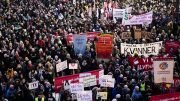Nearly 17 million babies are exposed to air so polluted and poisonous that it can harm the brain’s development, according to a UNICEF report.
The UN Children’s Fund said one in eight of the world’s 136 million children under one year old are exposed to toxic air.
Satellite images analysed by UNICEF suggested that 12.2 million of the vulnerable people live in southern Asia. An additional, 4.3 million babies in East Asia and the Pacific region live in areas where air pollution is more than six times higher than the international safe limit values.
‘Pollution is not only harmful to the children’s lungs, it can also lead to permanent injury while their brain is developing, and thus harms their future,’ said Unicef Director, Anthony Lake. He called on countries that exceed the safe limit values to increase efforts to reduce air pollution.
The UNICEF report pointed out that breathing contaminated air can damage brain tissue, and slow down cognitive development. This can cause the children to develop more slowly, and can lead to a lasting impact on the children’s development.
UNICEF encouraged parents to introduce measures to reduce children’s exposure to harmful chemicals, including tobacco products and ovens.
Additionally, the authorities are encouraged to invest in cleaner renewable energy, and make it possible for children to travel at times of the day when there is less contamination, and ensure that sources of extensive pollution are not near schools, health centres or hospitals.
‘No children should have to breathe in dangerous, polluted air, and no society can afford to ignore air pollution,’ said Lake.
NTB Scanpix / Norway Today


